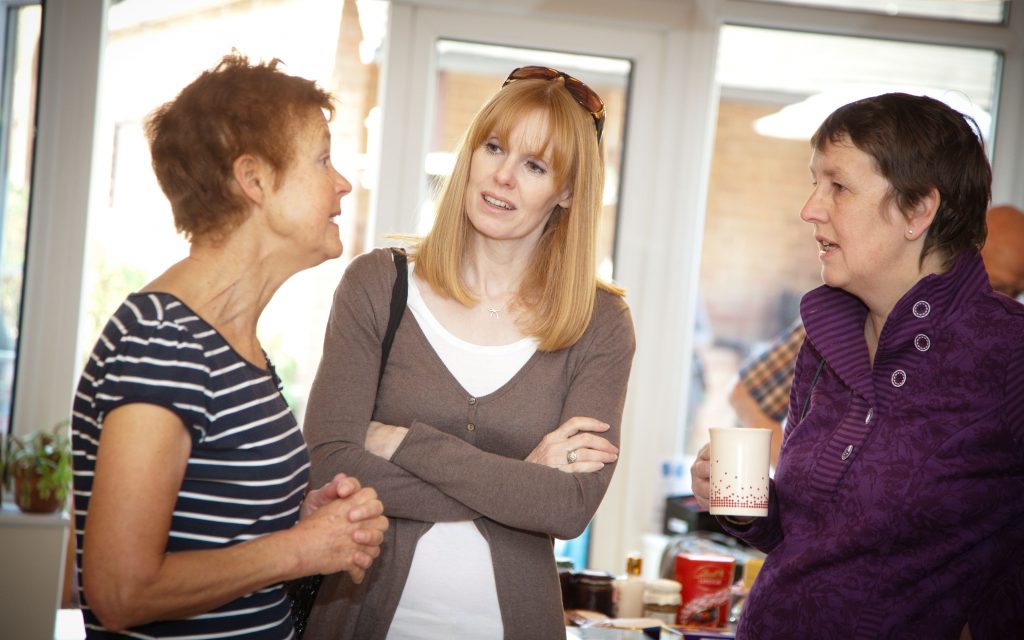A brain tumour diagnosis doesn’t just affect the person living with the tumour, it can have a massive impact on their family, friends and carers too.
Processing emotions, dealing with practicalities and the personality changes that brain tumours can sometimes cause, can all put a strain on relationships for everyone affected.
An expert view
We spoke to Dr Katherine Carpenter, Consultant Clinical Neuropsychologist and Chair of The British Psychological Society’s Division of Neuropsychology, about how a brain tumour diagnosis can affect relationships.
“Our relationships with partners, family and friends can be an incredible source of support in the face of a brain tumour diagnosis,” Katherine says. “But they can also be a source of frustration and confusion – just when we need them most.”
Katherine explains that we all use subconscious defence mechanisms to protect ourselves from unpleasant and painful thoughts and feelings. These can include:
- denial – when you refuse to accept the reality of a situation to avoid painful feelings
- repression – when you subconsciously try to suppress unpleasant thoughts, memories or experiences
- projection – when we attribute difficult feelings away from ourselves, for example, you may be convinced someone you find difficult doesn’t like you
- regression – when we become more childlike and slip back into more immature ways of thinking and behaving
- rationalisation – when we use logic and reason, however false, to distance ourselves.
“These psychological defences can be very useful at times,” says Katherine. “If you’re facing a difficult operation or therapy it can help to not think about it or temporarily pretend it isn’t happening.
“But it’s easy to see how these defence mechanisms can get in the way of openness and intimacy in our relationships.”
Katherine’s five relationship tips
There’s no ‘one size fits all’ when it comes to relationships, Katherine acknowledges, but the following tips may help.

1. Don’t jump to judge
Share your own feelings rather than quickly judging others.
You could say, “You probably aren’t aware, but when you do X it makes me feel Y.”
2. Acknowledge what’s happening – be aware that what’s happening affects both you and others around you. It’s okay not to be okay.
3. Give yourselves time – everyone having time to get used to the idea of the diagnosis and its implications is vital.
4. Get support – ask about professional help you can get from your clinical team.

5. Talk things through
Talking to someone neutral can be helpful to process what’s going on and your feelings about it.
Our blog post on telling your loved ones about a brain tumour diagnosis could help start those conversations.
Remember – if you need a listening ear, a guiding hand or simply have a question, we’re here to help. You can call our Information and Support Line on 0808 800 0004, Monday to Friday, or email support@thebraintumourcharity.org
Our community’s experiences
With Valentine’s Day just around the corner, our community have also shared their own advice on how to cope with changes to relationships with a partner after one person has been diagnosed with a brain tumour. Here’s what they said:
“I try to meet my partner where he is. Sometimes that means understanding his memory isn’t what it was and arguing with him is pointless. It also means learning to ignore or walk away from the nasty comments he makes, although sometimes it means calling him out on his meanness.” Lynn
“Make the time to communicate about it in the way you find easiest: text, write a letter or just talk. It’s easy to shut it away but makes it all so lonely. Communication is key!” Emily
It took me a while to realise my diagnosis was affecting my partner too. Once I started to understand exactly how things were changing, I slowly started adapting my behaviour by being more empathetic to her needs and not just my own.
Nic
“My husband and I made a promise to always be honest. If either of us is having a bad day, we choose a good time to allow each other the opportunity to completely offload with no judgement.” Suzanne
“I’ve worked really hard at looking after my needs and have now learned to detach emotionally. After my husband recently spent over a week moping around the house, I was able to calmly say, ‘I care but I’m going to live my life’. It sounds tough, but for the next two days he got up, showered, made me coffee and thanked me for dinner!” Karen

Join our online support community
Our online support communities are a great place to connect with other people affected by a brain tumour and share experiences of how you’ve managed relationships.
